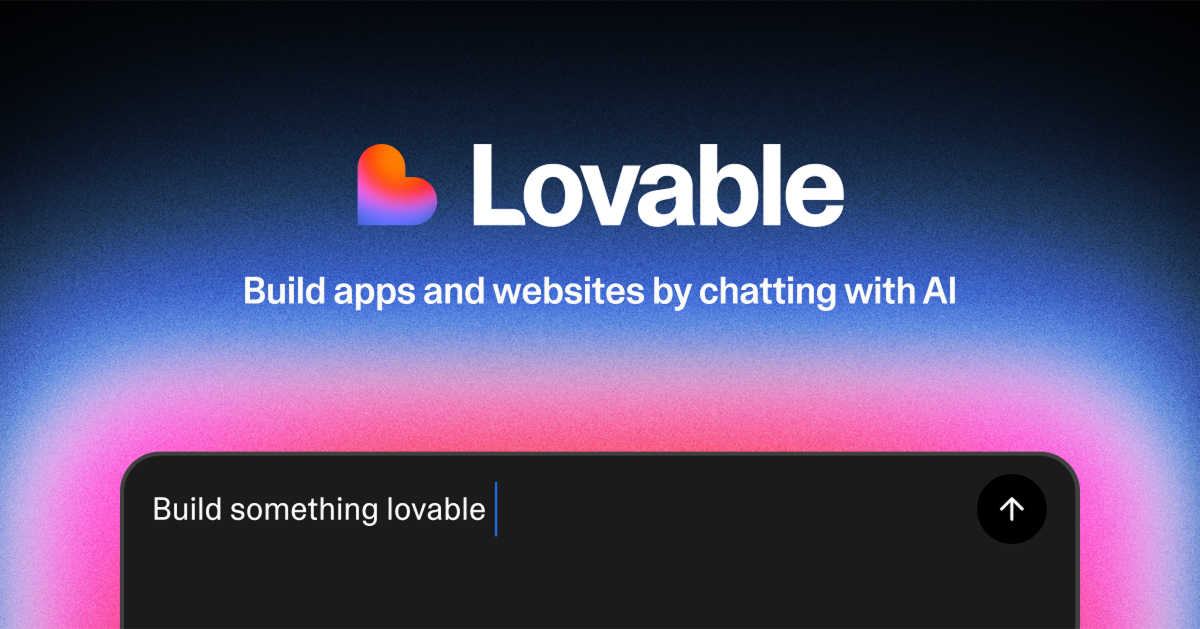No matter how effective and popular it may be, content marketing costs money.
Whether you have to hire content writers, invest in paid media ads, or use expensive marketing tools, to make your content marketing strategy, you need to make a serious financial investment.
In this article, you will learn how much content marketing costs, and how you can expect to invest in it.
Let’s get started.
The Costs Depend on the Strategy
Before discussing specific content marketing costs, we need to take a quick look at the parts that constitute a content marketing strategy. These parts will define the ultimate costs you need to incur to implement your strategy.
Content Planning and Governance
The first part of any content marketing strategy relates to the strategic and administrative part of a content marketing strategy.
By planning, I mean all the tasks required to develop a content strategy, which includes:
- Researching your buyer personas
- Developing a keyword plan
- Auditing your existing content
- Defining your ultimate goals and the KPIs associated with them
By governance, I’m referring to the organization of your content development process, which, in turn, defines the steps your company takes to create, publish, and promote a content piece.
In other words, content planning defines the strategy your company will use to achieve its goals, while governance defines who will be responsible for implementing the plan.
The fewer people involved in your content marketing process, the simpler the governance. As more people become involved in the process, the more complex (and important) the governance becomes.
The largest costs you can expect to see in this step include:
- The salaries of the people involved
- The software required to plan the strategy
- The rates of external consultants responsible, if they are needed.
Some of these tasks are the responsibility of the entire marketing team, so you may decide not to assign these costs to your content marketing efforts.
Content Creation
When it comes to creating the content defined in your strategy, the people involved, and their skill will determine your costs. If your content strategy focuses entirely on writing articles, then your writers will be your main expense. What’s more, the experience, topic, and industry will also impact the content creator’s costs.
To see more about what you can expect to pay a content writer, check the following article where I walk you through the rates for writers, editors, and copywriters around the world:
Are Your Content Writing Rates Too High or Too Low? Here’s How to Find Out
If you have an in-house team of writers, then your costs will be their wages; the only software expense you may have to incur will be using a grammar tool like Grammarly.
If you decide to hire a freelance content writer, your costs will be their writing rates.
If you plan to create ebooks, videos, webinars, among other content types that require a large investment for their production, then your content creation costs will rise quickly. Some of these costs will include:
- Hiring designers to create infographics and other graphic content
- Designing your ebooks
- Traveling to interview people—a common expense if you plan to create case studies
- Buying video and/or podcasting equipment
- Editing video and/or audio content
All of these costs can oscillate from a few dollars, if you use Fiverr to create a simple graphic, to thousands, if you plan to develop an in-house video production studio (think what Wistia does to see what I mean).
If you want to learn more about the costs associated with these content types, check out these articles:
- How Much Does a Quality Infographic Design Cost?
- How much should it cost to produce a podcast?
- How Much Does it Really Cost to Host a Webinar?
- How Much Does an Ebook Cost?
For authors and creators looking to build their personal brand through content marketing, using an all-in-one platform that lets you easily create eBooks, upload manuscripts, and access AI-powered editing tools can significantly reduce both time and costs.
Automated marketing features can help amplify your reach without the usual complexity, allowing you to focus on storytelling while technology handles much of the promotion.
Streamlining the publishing and marketing process this way is a smart, cost-effective approach for independent authors aiming to connect with readers and grow their audience efficiently.
Content Promotion
The content marketing costs associated with content promotion will depend on the type of campaign you want to execute.
If you plan to use your team to distribute your content organically—e.g., by using white-hat tactics like email outreach and guest posting to attract organic and referral traffic—their wages will be the main cost. Your team can use a few tools, like Ahrefs and Mailshake, and they will cost not more than a few hundred dollars per month.
If you hire a link building agency or freelancer to do it for you, then the costs can rise to at least $1,000 per month (later, you will see more data on these costs). Some white-hat agencies charge a few hundred dollars for these services, but I would doubt their effectiveness.
But it’s when you take the paid media route when your costs increase exponentially. Some companies spend five, six, or even seven figures a month on Facebook and Google advertising networks, and so can you if you aren’t aware of their risks.
Obviously, you can spend a few hundred dollars a month and call it a day, but be careful, as a small mistake can burn hundreds of dollars a day without you even noticing it.
Content Analytics, Optimization, and Lead Generation
In this final part, your content team tracks and improves the performance, and delivers the leads to the sales teams. Almost the entirety of the costs you can expect to incur here will be associated with analytics and lead generation tools—although the cost attribution will depend on how you organize your teams.
Most of the analytical and lead gen tools cost hundreds to thousands of dollars per month—think Adobe Analytics, Optimizely, and Pardot. Regardless of these high costs, if your company needs them, they are worth every penny. With an effective tracking framework, you can improve your campaigns’ effectiveness and increase your ROI easily.
As I’ve said a few times already, the overall content marketing costs will depend on your governance model and how you attribute these costs to your content marketing team. As a channel, content marketing works within several departments within a business, including customer support, sales, and product marketing.
If a content writer creates sales enablement content, these costs shouldn’t be exclusively associated with the content marketing team, but also to the sales team. These aren’t irrelevant points, so consider them when analyzing your content marketing costs.
How Much Does Content Marketing Cost IRL?
After we have covered how a basic content strategy is structured, we can now discuss the costs of implementing one, which you can categorize in three groups.
Employees and Contractors
Several types of people can be involved in your content marketing team. As I explained in my article on content writing rates, the costs of each content writer will vary depending on:
- Their experience
- Their skills
- Their location
It would be impossible to calculate all these variables, so to simplify this calculation, we will see the costs of hiring a full-time content marketing manager. If you were to hire one person to manage your content team, this would be the position to fill. You can use other titles, like “content marketing specialist,” who often work for a content manager, as well as writers, copywriters, and other content-specific titles.
According to Glassdoor US, the average salary of a content marketing manager is $56,779 per year.
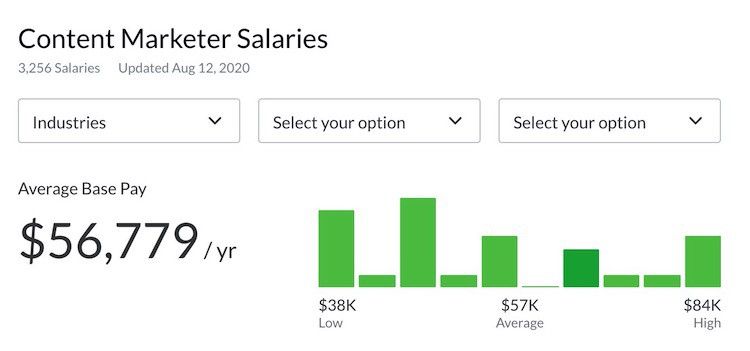
Payscale shows a much different image, with content marketing managers making $68,070 per year.
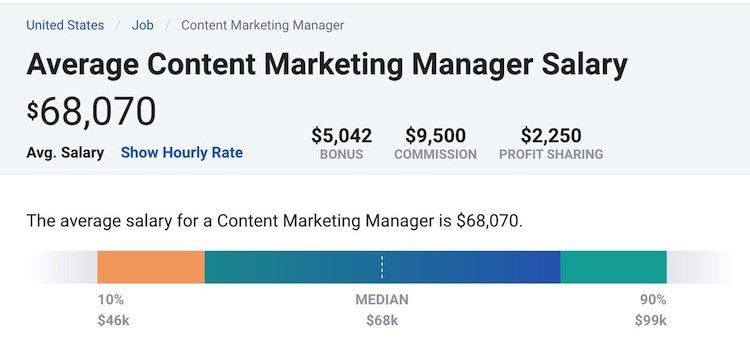
In the UK, Glassdoor shows an average content marketing manager salary sits at $£35,372 per year.
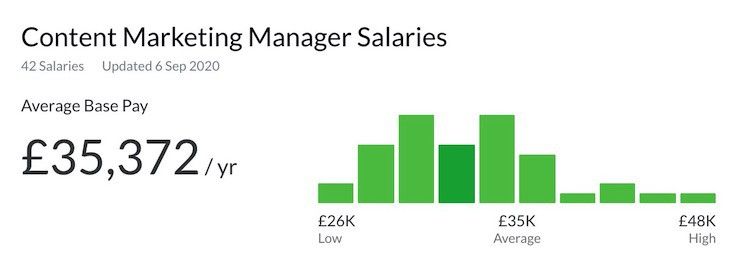
Other countries show the following salaries:
As you can expect, more experienced content marketers have higher salaries. For the position of “Senior Content Marketing Manager,” Glassdoor US shows an average salary of $79,370 per year, while Payscale once again shows an average yearly salary of $87,040.

Finally, Directors of Content make an average of $95,854 (Payscale US), while a Vice President of Content makes $134,466 per year.
Payscale didn’t have enough data for the position of VP of Content, while Glassdoor didn’t for the position of Director of Content. This is why I ignored their data.
Other team members a content marketing can include:
- Content creators
- SEO specialists
- Web analytics specialists
- Web designers
Each of these specialists has their own costs. For simplicity’s sake, I will ignore their expenses and leave you with the approximate costs shown above.
How Much a Content Marketing Team Can Cost
To get an idea of how much a content marketing team can cost to a software company, I asked Ben Goldstein, Head of Content and Communications at Nutshell, about the costs they incur:
At the beginning of this year, I was given a monthly budget of $10,000 for content production and $10,000 for content promotion. Lately, that’s broken down like this:
Production__:
- $4,500 to pay our part-time Content Marketing and SEO Strategist
- $850 for a content agency that we keep on retainer to produce 2-3 blog features per month
- About $1,200 to pay our other freelance bloggers, who earn $250-$500 per article
- Up to $4,000 on video projects (i.e., product announcements, virtual event hype videos)
Promotion__:
- Up to $5,000 to promote our blog articles and content offers in third-party newsletters and other outlets
- A $3,500 retainer for an off-page SEO agency to acquire backlinks for strategic Nutshell content
In terms of software tools, our content team uses AgoraPulse for social scheduling ($99/month) and SEMRush for keyword research ($99.95/month).
[/note]
Software
Your software costs will depend mainly on your stack. A 2018 survey from Boardview found that the average marketing tech stack has 32 tools.
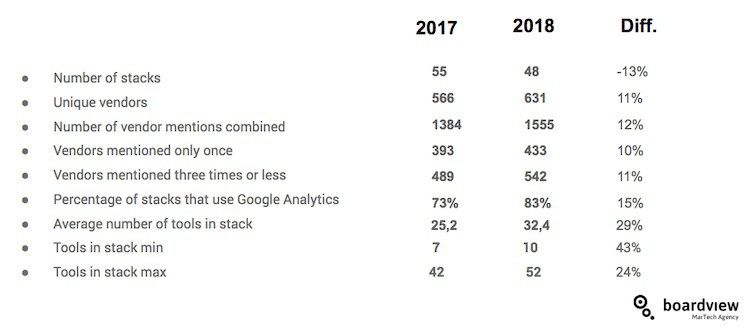
From the entire marketing tech stack, Boardview found that 31% belonged to content marketing tools.
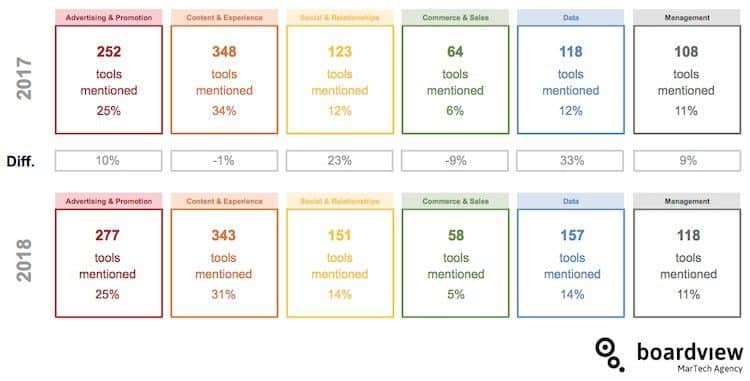
Within the content marketing stack, the following tools were the most popular:
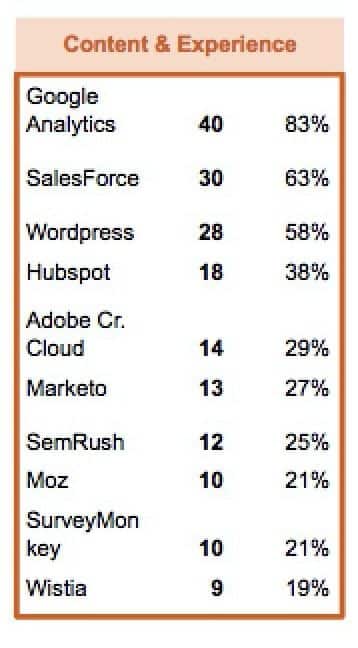
The most popular tools are either free—Google Analytics, WordPress—or affordable in their lowest plans—Hubspot, Salesforce. Some other tools related to SEO, like Moz and SEMrush, and others to video, like Wistia.
Considering this data, we have to ask: what is a content marketing tool? I wouldn’t say Google Analytics is a content marketing tool, but an analytics tool content marketers use—two different observations.
Based on my experience, some tools exclusive to content marketers are:
- CoSchedule for content planning and management
- Grammarly for editing and proofreading
- GatherContent for operations management
How Much Your Software Costs
The simplest answer is, it depends on your company’s size.
- If your company has less than five content marketers, then you can expect to use CoSchedule, which costs as little as $14 per month, and Grammarly, which has a free plan and a premium (and worthy of paying) plan that costs as little as $11.66 per month.
- If you have more than five content marketers, you can add GatherContent to this, which costs $99 per month, and CoSchedule’s higher plan, which costs as little as $29 per month.
In total, you can pay anywhere from $26 to $125 per month. If you also include Hubspot and Salesforce to your content marketing software expenses, this number would rise significantly. But as I said previously, I’d have a hard time justifying such a cost attribution given that other departments also use these tools.
Promotion
Both salaries and software are fixed costs. If you hire more people or use more tools, you will pay more, but if you check your P&L statement, you will not see a random variation to these items as you do if you invest money on Facebook ads or other promotional channels.
If measuring your fixed content marketing costs depends on your exact company size and needs, measuring your content promotion costs will be even more challenging.
Content promotion can cost as much or as little as a company desires. To get to a realistic approximation, I will analyze two of the largest and most popular content promotion channels and their costs:
SEO
You can break down your SEO costs around three of its constituting parts:
- Keyword research: You pay someone to find keywords to rank for. I have seen SEO specialists charge $500 to $5,000+ for a keyword research campaign, depending on its complexity and size.
- On-site optimization: This is an ad-hoc set of tasks anyone with basic SEO training can do. You can hire a cheap freelancer in Upwork, or you can train your writers to do it for you. Overall, don’t expect to pay too much for it.
- Link building: A link building campaign can cost anywhere from a few dollars to pay for a link (FYI, not recommended) to thousands of dollars to develop a complex outreach PR-like campaign. The costs will depend on the content promoted, the industry, and the link building tactic in question.
I have assumed you invest in these three items exclusively. If you hire an SEO expert, their overall costs will include any or all of these items.
To measure the costs of an SEO specialist, you will also have to include the implementation of SEO audits, technical optimization, and a retainer to keep up the work.
You can check these costs in this article.
From all of these items, I’d say link building is the most expensive. There are white-hat companies like uSerp and LinkBuilder.io that charge anywhere from $200 per link to $8,000 and more for link building campaigns.
Also, SEO takes time, so if you are going to invest in it, give it at least six months to a year to bring any results.
Paid Advertising
Paid advertising is a beast of its own. The main aspects that will define your paid ads costs will be:
- The advertising networks you use—Google Adwords and its display network are often more expensive than Facebook.
- The audiences you target—the more people target it, the more it costs.
- The inventory you buy—the more you buy, the more you will spend.
For example, a content promotion Facebook ads campaign can cost from $10 to $10,000+ per month. Remember:
- Facebook and Google’s revenue and market valuation depend almost entirely on their ad networks, so expect to spend good money to use their ad networks.
- They are expensive because they work, so even if you spend five figures, you can make many times that amount if you have a functioning funnel in place.
Considering these costs, it’s hard to pinpoint a specific number to any type of paid promotion. My only advice to you is this: only invest in paid ads once you have a working funnel.
If you know that spending $100 to promote a new post drives 100 visitors, 10% of whom convert into email subscribers, and 5% convert into paying users with an LTV of $500, you can develop a profitable paid ads model.
If you have decided to invest in paid ads without a clear paid acquisition model in place, then be careful; otherwise, you will end up throwing money to the toilet.
Should You Outsource Your Content Marketing?
This is a key question you are probably wondering, and whose answer depends on the following three factors:
- Your team know-how and experience: If you know content marketing works but lacks a knowledgeable and experienced team, outsourcing is a good option.
- Your focus: If your team members already do content marketing but lack the focus to master it and scale it, then outsourcing makes sense.
- Your resources: If you have lots of money to spend and lack people and focus, you can outsource your content marketing. If you don’t, then aim to develop a content team that focuses exclusively on this channel.
If you lack a team, focus, and resources, then outsourcing isn’t an option. It’s best to start doing content marketing in-house and outsource strategically, instead of hiring someone to do this work for you without a clear plan. Most people who think content marketing doesn’t work often say so after falling for this mistake.
The good part of outsourcing your content marketing is that you can safely know your efforts’ cost. Most content marketing agencies can execute tasks as diverse as planning, creation, promotion, and beyond. For these services, they can charge anywhere from $1,000 to $10,000+.
Since most agencies charge based on custom projects, you will have to discuss your needs with them before you get a quote. Two popular content marketing agencies that openly share their prices indicate the following costs:
- AudienceOps: It starts at $850 and goes as high as $1,700 per month. It’s entirely focused on content creation.
- WebFX: Charges between $1,800 to $6,000 per month. They offer many different services like SEO, which you pay separately.
Other agencies I highly respect, and which I’m sure will do a fantastic job at executing on your content marketing strategy are:
I don’t know their costs, but I’d think they charge at least $5,000 for a monthly retainer, including content creation and promotion.
Content Marketing Costs: A Summary
Overall, your content marketing costs will depend on your company’s size, priorities, and resources.
As a general rule, your content marketing costs will depend on:
- Your content marketing team members
- The software they use
- The amount of work you outsource
- The amount of money you invest in promotion
Despite the 3,000+ words I wrote, I didn’t mention the highest content marketing cost: time. Spending more money on creating content without promoting it and promoting the wrong content won’t get you far.
Focus on nailing your brand voice, your product/market fit, and a clear target audience to create content for. The costs to attract and convert that audience will be secondary to the results you will get if you can keep the efforts up long enough.
Talk about a philosophical ending to a dry analytical article, right? 😉

